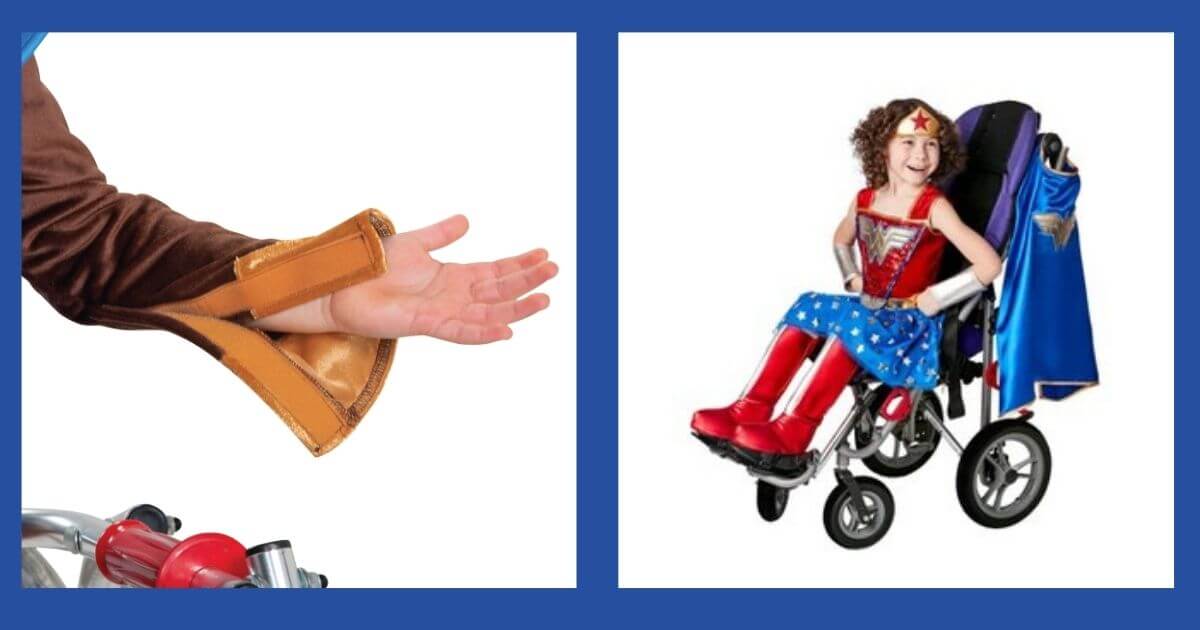
Costume Suppliers Broaden Their Adaptive Plans
With apparel brands and retailers having tailored offerings to consumers with disabilities and special medical needs, suppliers of licensed costumes are following suit.
As Halloween approaches, Jakks Pacific’s Disguise Division and NECA’s Rubie’s Costume Co. both recently unveiled licensed adaptive costumes – with hidden access to medical ports, magnetic closures instead of buttons and arm sleeve, abdominal and pant inseam openings for easy dressing – featuring Disney, DC Comics, DreamWorks, Paw Patrol and other characters that have launched online (Amazon Fun.com, Walmart and Target) and will be available in some Target stores in September.
Category expansion
The collections mark a second Halloween season with adaptives for Disguise, which launched Disney-based wheelchair covers in 2020 and expanded this year to an 18-SKU line ($44-$50) to include jumpsuits and dresses in several sizes. Meanwhile, Rubies introduced a Superhero Series Powered by Marvel along with Captain America, Spider-Man and Mandalorian jumpsuits and Wonder Woman dresses. Last fall, Rubies also was a sponsor of the sports challenge in the “Superhero Series”, a participation sports series in the UK dedicated to people with disabilities.
“Costumes have always followed softlines” in terms of trends “so this is really the next step for adaptive,” says Tara Hefter, President and General Manager at Disguise. And while the costumes may differ from standard versions in design and features, they’re sold at comparable prices ($25-$50), says Rubies’ Managing Director Mike O’Connell. Target on Tuesday (Aug. 17) was promoting the Spider-Man and Wonder Woman costumes at $15 after a $10 discount.
“Dress-up play is a very important part of childhood, allowing children to explore different characters and role models and shape who they become,” says O’Connell.
Taking cues from apparel
In holding to form, the costumes take their fashion and style cues from apparel, adaptive versions of which have grown rapidly since Tommy Hilfiger and online shoe seller Zappos.com – the latter allowing customers to buy a single shoe instead of a pair — along with Target launched non-licensed lines in 2017. Target has since built the adaptive apparel business under its Cat and Jack private label into more than 100 styles including zippered sneakers, chambray jumpsuits with abdominal openings, and backpacks with easy-grab zippers and straps that hook onto wheelchair handles.
They have since been joined by J.C. Penney (Thereabouts), Kohl’s under its So, Sonoma and Jumping Beans private labels and Marks & Spencer with the Kids Easy Dressing collection. Dedicated brands have emerged, such as Billy Footwear, which recently launched a online-only collection with Target featuring around-the-toe-zippers to make shoes easier to take off. Each of the retailers have adaptive clothing sections on their web sites where they carry the majority of their offerings and promote the apparel.
And while licensed brands appear so far not have crossed over, adaptive apparel is a growing business. The global adaptive apparel market is expected to hit $349 billion by 2023, up from $288 billion in 2019, according to Coresight Research.
“There is an opportunity for retailers to understand adaptive consumers at a macro level and generational level — how and where these consumers want to shop, the technology that they prefer, what their motivations are, and how they want to be marketed and advertised to” Coresight said.

















